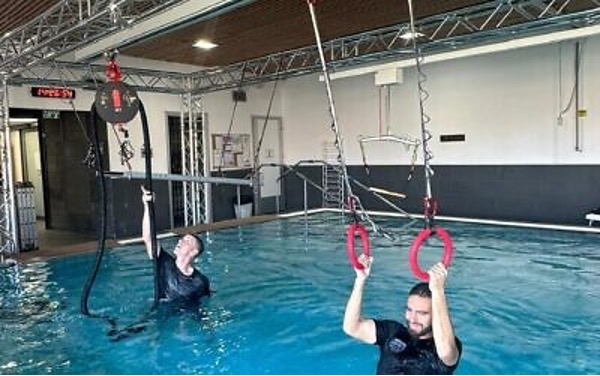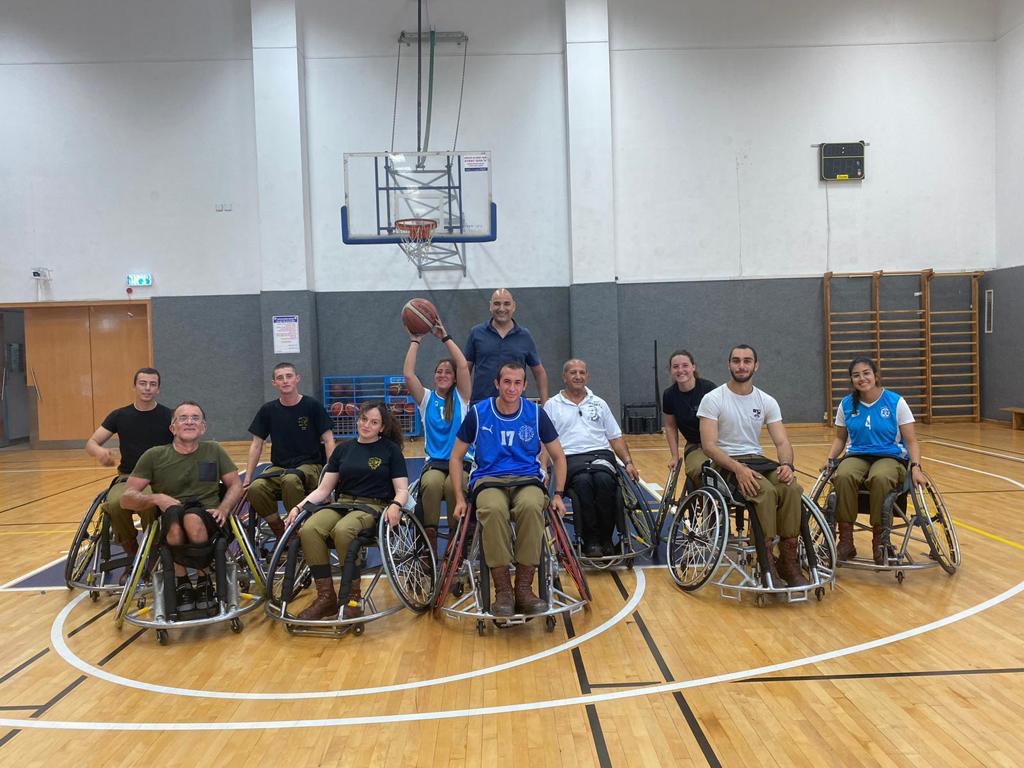News and Media
SPECIAL REPORT: We’re now their parents: hospital giving hope to wounded Israelis
At the heart of Tel Aviv’s Beit Halochem sits a series of sculptures by one of its members, Amnon Sharon. Wounded and captured during the Yom Kippur War, Sharon spent months in a Damascus prison, where he was tortured and kept in solitary confinement.
By LIANNE KOLIRIN March 5, 2024, 10:55 am
Though he returned to the Israel Defence Forces on his release, the soldier spent years battling his demons. Eventually, during visits to Beit Halochem, he shared the story of his captivity through art.
Dozens of wounded veterans, their relatives and employees pass Sharon’s work each day but, since 7 October, the display has become all the more poignant. “All of us are in trauma,” said Ora Seidner, head of project development at Beit Halochem Israel.
“Our brothers, husbands and sons are gone for months and months… you never know if you will see them again and all around you your friends are going through the same thing.”
Beit Halochem translates as ‘home of the warrior’ and in the coming months and years it will prove to be exactly that for many of the men and women currently serving in the IDF – just as it has been for Sharon.
“We’re going to be their mother and father for the rest of their lives,” Seidner told Jewish News. “It’s not just now, it’s not just something that they’ll need when they leave hospital.” The injured will not be the only ones supported by the charity either, she explained.
“It has always been in the DNA of this organisation to view the veterans in a holistic way. We aim to look after their families as much as we look out for them, because we realise that the family has to take part in the rehabilitation process.”
“We’re going to be their mother and father for the rest of their lives,” Seidner told Jewish News. “It’s not just now, it’s not just something that they’ll need when they leave hospital.”
Partially funded by the Ministry of Defence but largely bolstered by charitable donations, the organisation has four centres across Israel – in Tel Aviv, Jerusalem, Haifa and Be’er Sheva – that provide a home-from-home atmosphere for those wounded during military service.
Chair of Beit Halochem is Edan Kleiman, who for the past five years has led it into a new era of reform. Among oyherr things, it has placed great emphasis on upholding the legal rights of Nechei Zahal and initiating the ‘One Soul’ reform in the Knesset, securing more benefits and privileges for members.
Israel’s history has been punctuated with wars and military operations, which has meant Beit Halochem is in constant demand. The centres offer everything from wheelchair basketball and swimming pools to therapy sessions and a place to hang out with friends and family.

But now, more than four months since the horrific Hamas attacks on Israel, Beit Halochem is facing the biggest crisis since its establishment in 1949. “The numbers have been unfathomable,” explained Seidner, who said the organisation welcomes 300 to 500 new members annually.
“In the four-plus months since 7 October we’ve had 3,200 recognised disabled veterans. In a normal year that process usually takes from six months to a year. “Because our organisation pushed and works hand in hand with the Ministry of Defence, the ministry agreed to speed up this process.”
As the war against Hamas continues, the number of wounded will obviously climb – and, with it, the pressure on Beit Halochem. “We will have to double, if not treble, what we offer those with physical disabilities,” said Seidner.
“The physical injuries will stop at a certain point if the hostilities end, but the PTSD [post-traumatic stress disorder] more often than not takes time to diagnose.”
Beit Halochem’s PTSD programme will have to quadruple to meet demand, she said, which means more therapists, more equipment and expanded facilities. It is not just the newly-injured who will need the support of the charity in the coming months and years, but also its 51,000 existing members.
As soon as news began to emerge of the scale of Hamas’ assault, Beit Halochem knew it had to act. It immediately set up a call centre to check in with every one of the existing members. The operation revealed some members had been directly caught up in the violence, with family members killed, wounded or kidnapped, while many others had to be evacuated from their homes.
Immediate support had to be found for those directly impacted, including makeshift accommodation, food for families and visits to wounded – including many amputees.
“It’s really hard for us to grasp the scope – the injuries are horrific,” explained Seidner.
“On 7 October, hundreds of special forces rushed into what they had no idea was the worst ambush of their lives.
“Unprepared completely, they were shot at with bullets, rocket-propelled grenades and all sorts of anti-tank missiles. They had these horrific injuries and they couldn’t be evacuated for hours.
“We have brought some of them here to Beit Halochem, still in their wheelchairs, still in their bandages, just to show them that this place exists,” she added.
Among the wounded is Ofir Dahari, a 50-year-old border police officer. On 7 October, he and his unit took on the terrorists in Sderot and, later, Kibbutz Nir Am. Miraculously, they fended off the Hamas invaders, but Dahari was shot and injured.
He spent three weeks in hospital where he underwent five operations, including procedures for broken bones and torn nerves. It was while in hospital that Dahari, who is almost certain to need more surgery, was introduced to Beit Halochem.
“I’m optimistic but realistic about my long journey ahead,” he said. “Beit Halochem volunteers visited the whole time I was in hospital and said they had been in the same shape as me. That meant a lot.”
Dahari is likely to be welcomed at the centre in Be’ersheva which, due to its southern location, is expected to cater to many of those caught up in the Hamas attacks.
A new centre had been due to open in Ashdod in 2026, but this has now been fast-tracked and will feature the national centre for rehabilitation and treatment of post-trauma patients.
Other expenses include the overhaul of Beit Kay in Nahariya, which the charity intends to run as a “wellness hub” for disabled veterans in the north.
The state-of-the-art hydrotherapy pool at the Tel Aviv centre is currently fully booked, with staff running 12,200 treatments per month. But this will no longer be sufficient.
Among the many things on the organisation’s updated shopping list are more adapted wheelchairs for basketball.
“We start introducing people to wheelchair basketball at a very early stage as they can do it still in their bandages, and it starts making them feel really good about themselves,” said Seidner, while adding that each chair costs $8,000 (£6,300).
Overall, Beit Halochem’s fundraising will need to expand by around 23 percent in order to meet the huge demand. “It’s overwhelming,” Seidner said.
Recognising the long and costly journey ahead, donors gave generously to a 36-hour match-funded campaign run by Beit Halochem UK in December, raising an incredible £2.25 million.
Spencer Gelding, CEO of the UK charity, said: “We are overwhelmed and humbled by the tremendous support we received during this campaign.
“The generosity of our community has surpassed all our expectations, and has allowed Beit Halochem UK to surpass our initial fundraising goals significantly.”






